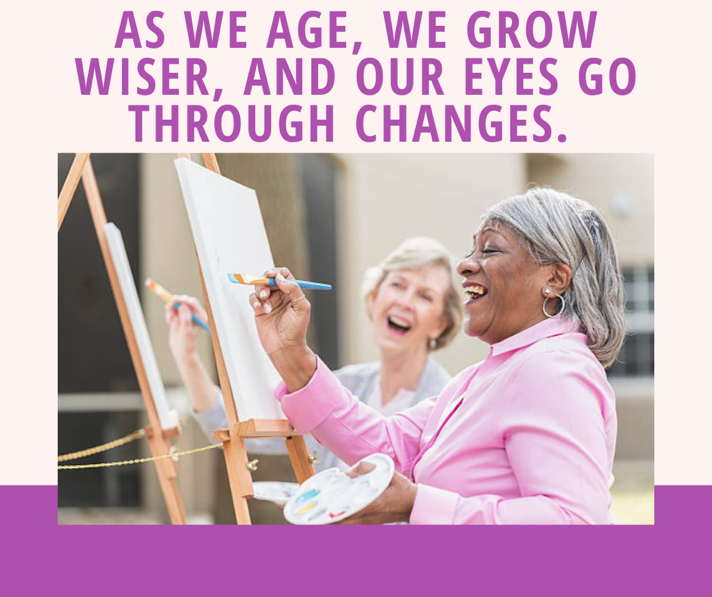Posted by: North Georgia Eye Associates in Eye Health

As we age, we undergo a few changes as adults, from our hair turning gray to changes in our eyesight. One of our priorities is ensuring our patients are empowered with information to know what to expect to minimize risks.
What Are The Common Age-Related Vision Changes?
- Increased sensitivity to glare – this can be an issue when driving.
- Difficulty reading and doing things close-up – this is called presbyopia, when the lenses become less flexible, making it hard to complete activities such as reading a menu.
- Brighter lighting is needed to see – As we age, we often need more light to see, work and read.
- Small changes in color perception – The eye’s clear lens can be slightly distorted and discolored, allowing muted colors. These changes may also signify cataracts, a clouding of the eye. According to the Mayo Clinic, about half of all 65-year-old Americans have some degree of cataract formation in their eyes.
Major Age-Related Eye Diseases
- Macular Degeneration (AMD) – More than two million Americans currently have age-related macular degeneration, which is expected to double by 2050 due to the aging population.
- Glaucoma – The risk of glaucoma increases each decade after the age of 40 from 1 percent to 12 percent in your 80s.
Many eye conditions can have the option of treatment or are delayed with early detection; annual eye exams can assist in proactive detection.
Gracefully Aging With Healthy Vision
One significant component of promoting a healthy vision is to live a healthy lifestyle. Eat healthily, stay active, and don’t smoke. Remember to protect your peepers from UV rays by wearing UV-blocking sunglasses outdoors on a sunny or cloudy day. Also, take breaks from the computer screen, especially if you spend your work hours staring at a computer screen, resulting in digital eye strain. Remember to follow the 20-20-20 rule: every 20 minutes, focus on an object at least 20 feet away for 20 seconds. Your eyes will love you for it!
Your Healthy Eyes Is Our Priority!
If it has been a while since we have seen you, call us TODAY to schedule an appointment to make your eye health a priority.

References: American Academy of Ophthalmology and the American Optometric Association. This blog provides information and discussion about eye health and related subjects. The content provided within this blog and any linked materials are not intended and should not be considered medical advice. If the reader or any person has a medical concern, they should consult with an appropriately licensed physician.
